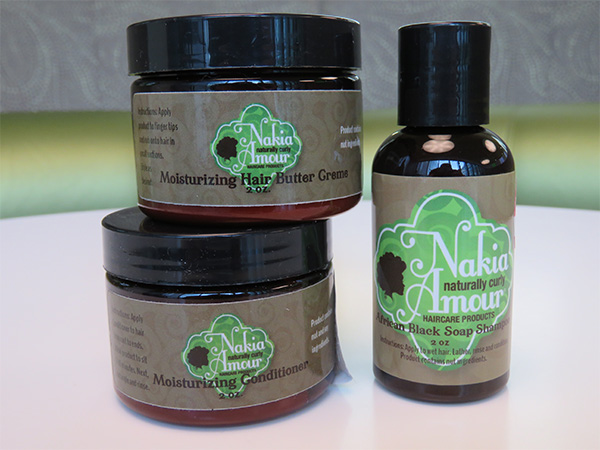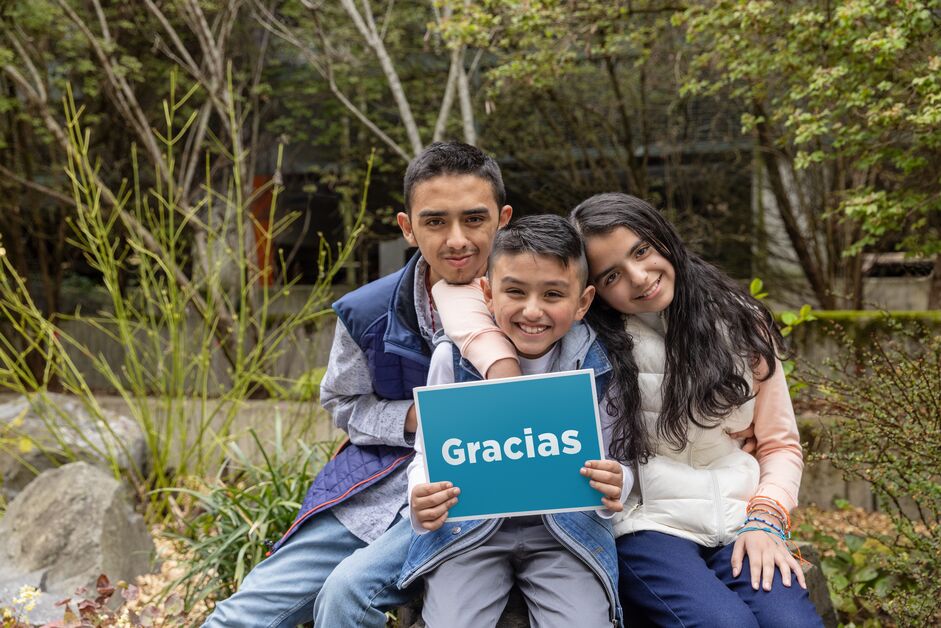Care Delivery
Expanding Hair Care Products for Multi-Textured Tresses
Over the past few years, teams at Seattle Children’s have been working to offer additional hair care products that are better suited for patients with coarse and curly hair. In 2020, Seattle Children’s Black and African Heritage Network (BAHN) initiated and led this work by facilitating a product donation drive and partnering with other teams to search for and procure additional hair care products.
More recently, BAHN and the Psychiatry and Behavioral Medicine Unit (PBMU) participated in a pilot project with the Supply Chain team to begin regularly offering products to patients. This came to fruition because of the advocacy of BAHN and involvement of the PBMU Equity Advisory Group, the PBMU Care Delivery Council and countless PBMU team members who advocated for patients’ needs at Seattle Children’s. These groups recognized one of the many ways whiteness is centered in patient care: healthcare organizations traditionally have supplied products that are sufficient only for the care of one type of hair.
Patient-centered care considers the patient’s physical and emotional comfort. For many people, how they look affects how they feel.
Providing culturally appropriate hair care products allows patients to present themselves with dignity while being in a clinical setting, which is an environment that can be stressful. Being sensitive to the needs of Black patients is an opportunity to shift our focus and recognize the importance of paying attention to the needs of a wide array of ethnicities.
Finding the right supplier; PBMU nurses help develop training
Before this pilot, the hair care products available to patients were limited to those with straight/ non-textured hair. This limited offering is an example of providing “equal care,” meaning everyone has access to the same type of product for cleaning and caring for their hair, versus “equitable care,” meaning everyone has access to the type of products they need to feel clean and cared for.
To provide patients with more equitable care, the BAHN team helped search for a vendor who could provide hair care products for people with tresses and curls that may tangle more often. Part of BAHN’s mission involves supporting Black-owned business; this was part of the group’s search criteria as well. The Strategic Sourcing and Supply Chain teams partnered with a Black woman-owned company called Nakia Amour to supply “hair care products to serve multi-textured tresses,” as described on the company’s website. Sample-sized shampoo, conditioner, and moisturizing crème were made available on the PBMU, plus stocking caps and shower caps for hair protection.
Katy Scott, PBMU’s unit-based educator and a Nursing Professional Development practitioner, developed a training for team members to learn how to care for a variety of hair types and Sarah Caufield, PBMU nurse and quality support leader, figured out the logistics of delivering the products from PBMU’s supply area to the patients.
Questioning norms

An array of Nakia Amour products broadened the hair care products available to patients.
Caufield and Scott spoke with team members and families who felt the Nakia Amour products were integral to providing equitable care. This pilot project showed that these natural hair care products were quickly accepted as a standard of care by team members.
“As a nursing leader who is white, I became acutely aware of the ways whiteness had been centered in my own nursing education and experience caring for patients on the floor, and my own gaps in knowledge,” Scott comments. “I’m grateful to those who spent time educating me through their blogs, videos and pamphlets, and I would like to challenge other white leaders in nursing education to question what we have been taught as the ‘norm.’ I’m willing to bet that our norm is largely centered in whiteness and devalues the experiences and needs of those from different backgrounds.”
These hair products are available to units throughout the hospital from Central Supply. Director of Clinical Nursing Quality and Safety Kristi Klee and the PBMU Care Delivery Council have embarked on an effort to stock products on acute care units.
Scott adds, “I’m grateful to the Strategic Sourcing and Supply Chain teams for continuing to stock these hair care products, given the importance these products hold for our patients.”
Learn about this work and more in the 2022 Nursing Annual Report. (PDF)
Delivering Language-Concordant, Culturally Competent Care
Seeking care when your child needs it can be scary enough — imagine if you do not speak the same language as the doctor or nurse who is caring for your child. To improve patient care, the Division of Pediatric Otolaryngology has created the Seattle Children’s Spanish Pediatric Otolaryngology Clinic. Now when families call the Patient Contact Center for an otolaryngology appointment and Spanish is listed as the language for care, the scheduler offers a visit at the Spanish clinic.
This important step to address an unmet need and provide more equitable care started with Dr. Juliana Bonilla-Velez, a pediatric otolaryngologist who envisioned a clinic experience where Spanish-speaking families could receive care in their own language, allowing communication directly with members of their care team without the additional step of interpretation. As Bonilla-Velez emphasized in a blog post for the Washington Chapter of the American Academy of Pediatrics, “Having providers who are race-concordant and language-concordant with their patients has been linked to increased participatory decision making, higher physician ratings, better understanding of their disease, greater compliance and greater patient satisfaction.”
Working Toward the Entire Team Speaking Spanish
 To get the Spanish Pediatric Otolaryngology Clinic started, Bonilla-Velez included in the planning team members from nursing, Interpreter and Translation Services, registration, and Audiology. At first, communication with the patient and family in Spanish was limited to Bonilla-Velez and a medical assistant who was certified in Spanish. The team included a nurse and an audiologist who were preparing to take the certification exam but still required an interpreter with patients. Fortunately, the division was able to secure a dedicated interpreter who moved through the clinic with each Spanish-speaking patient, which provided consistency for interpretation while the clinic continued to work toward a fully immersive Spanish-speaking experience for families.
To get the Spanish Pediatric Otolaryngology Clinic started, Bonilla-Velez included in the planning team members from nursing, Interpreter and Translation Services, registration, and Audiology. At first, communication with the patient and family in Spanish was limited to Bonilla-Velez and a medical assistant who was certified in Spanish. The team included a nurse and an audiologist who were preparing to take the certification exam but still required an interpreter with patients. Fortunately, the division was able to secure a dedicated interpreter who moved through the clinic with each Spanish-speaking patient, which provided consistency for interpretation while the clinic continued to work toward a fully immersive Spanish-speaking experience for families.
“The Otolaryngology clinic team is so happy to be included in the work of bringing Dr. Bonilla-Velez’s vision to fruition,” comments Julie Burns, nurse manager, clinical operations in Otolaryngology. “The nurses in Otolaryngology have collaborated with the Spanish-speaking members of the team and the ability to connect with families — and seeing and hearing their appreciation even though we haven’t met our goal of a fully Spanish-speaking clinic yet — inspires us to keep going toward that goal.”
Patients and families leave the clinic with an after-visit summary (AVS) in Spanish, which the clinic nurse and Bonilla-Velez complete collaboratively with the help of a number of AVS smart phrases (i.e., blocks of text) that have been translated into Spanish. “The goal is to provide a seamless Spanish experience through all points of clinical contact with the family, from their check-in through clinic discharge,” Bonilla-Velez says.
Collaborating With Bellevue Clinic and Surgery Center’s Enhanced Recovery Program
As part of this ongoing work, nurses at the Spanish Pediatric Otolaryngology Clinic are collaborating with nurses at the Bellevue Clinic and Surgery Center to include information in Spanish as part of the Enhanced Recovery Program (ERP). This effort aims to improve the participation of Spanish-speaking families in that program and extend the benefit of the ERP outcomes to more patients and families.
Learn about this work and more in the 2022 Nursing Annual Report. (PDF)
Working at Seattle Children’s
To reach our goals, we are committed to recruiting and retaining the best nurses. We invite you to search our current job openings.
Seattle Children’s provides opportunities for our nurses to learn and grow in an innovative environment while being in full partnership with other providers on multidisciplinary teams. We support and engage our nursing staff with training and educational opportunities, state-of-the-art-facilities and equipment, shared governance and comprehensive benefits.
When hiring, we look for nurses who share our passion for family-centered care and who practice at the top of their profession. Whether you are a new nursing graduate eager to participate in our healing environment, or a seasoned professional committed to advancing the practice of nursing, we welcome your application.